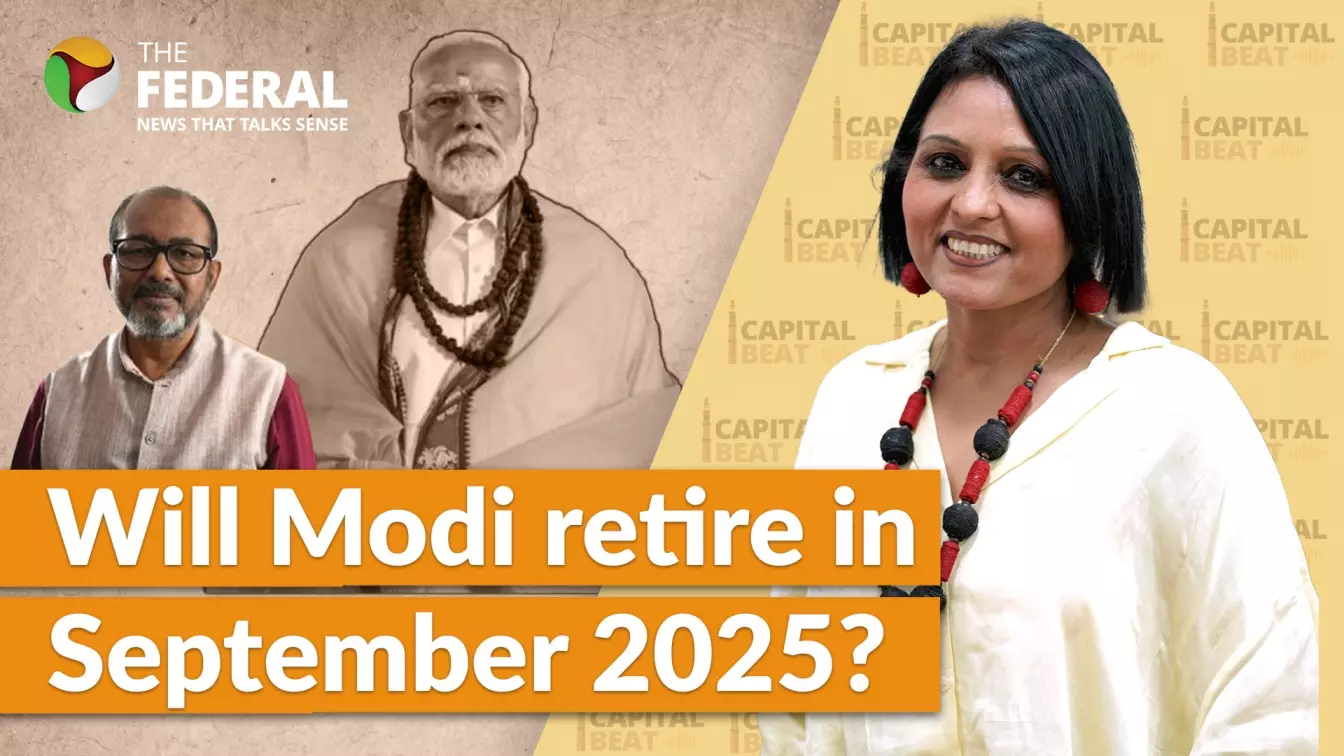
Nilanjan Mukhopadhyay on Modi's retirement
Nagpur visit, Raut's claim, BJP's Mughal jibe: Is Modi retiring this year?
Sanjay Raut claims RSS will pick Modi's successor when he turns 75 — is he right? The Federal speaks to author Nilanjan Mukhopadhyay

In the latest episode of Capital Beat, veteran journalist Nilanjan Mukhopadhyay spoke to The Federal on the political ripples created by Prime Minister Narendra Modi's recent visit to the RSS headquarters in Nagpur. With Modi nearing 75, speculation is rife about his political future, RSS ties, and the BJP's next national president.
No retirement yet
The conversation opened with a strong rebuttal to Shiv Sena (UBT) leader Sanjay Raut's claim that Modi's visit to Nagpur was to discuss retirement. Mukhopadhyay pointed out that both Modi and RSS chief Mohan Bhagwat turn 75 this year, and neither shows signs of stepping down. "For the RSS, this is the centenary year. There's no reason to change guard now," he said.
He also dismissed the notion that the BJP's unwritten 75-year rule is uniformly enforced. "Modi used the rule selectively to retire people like LK Advani and MM Joshi," he noted, adding that other leaders like Yediyurappa served in key roles beyond 75.
Also read | Why September 2025 could be make or break for Narendra Modi
Opposition's misfire?
On whether this issue benefits the Opposition, Mukhopadhyay was skeptical. "It can't be applied universally. The Opposition itself has many senior leaders over 75," he said. Modi remains the most popular political figure in India despite some decline in approval, he added.
The discussion then turned to the significance of Modi's Nagpur visit. Was it a symbolic reset in RSS-BJP relations? Mukhopadhyay confirmed that Modi met senior RSS functionaries, including Bhagwat and Bhaiyyaji Joshi, and paid homage to RSS founders. But more than ceremony, the visit marked a recalibration.
"There’s a realisation on both sides: they remain mutually dependent," he said. After a period of friction, especially around the 2024 Lok Sabha polls, both RSS and BJP seem to have agreed to work together again.
BJP's changing stance
Modi’s recent references to the RSS in positive terms, including during a podcast with Lex Fridman and a speech at Madhav Netralaya, signal this shift. Mukhopadhyay said it’s a message of reconciliation: "It tells the RSS that Modi is not undermining them."
The alignment is strategic, too. Modi needs the RSS’s grassroots machinery, especially as the BJP’s NDA allies like JDU, RLD, and Chirag Paswan’s LJP increasingly assert their interests. "He realises that minus the RSS, the BJP can't hit the majority mark," Mukhopadhyay observed.
While Devendra Fadnavis dismissed speculation around Modi’s retirement by calling it a "Mughal mentality," Mukhopadhyay critiqued the analogy. "Why invoke Mughal history in political succession?" he asked, noting the BJP’s long-standing use of Mughal imagery for ideological positioning.
He pointed out that both Modi and Bhagwat have previously dismissed talk of retirement, with Amit Shah affirming that Modi will lead the BJP through 2029.
Picking the next BJP chief
Mukhopadhyay also addressed the upcoming decision for the next BJP president. With JP Nadda’s term extended multiple times, the announcement is expected soon, possibly around the BJP’s foundation day in April.
"The name is likely finalised, but it remains under wraps," he said. Reports suggest both Modi and RSS will make compromises and opt for a mutually acceptable candidate. This marks a return to a collegial decision-making style not seen in the Modi era so far.
Mukhopadhyay emphasised that the new BJP president will not be the sole choice of either Modi or the Sangh: "Both sides will have reasons to be happy and reasons to be unhappy."
He debunked reports that Nadda could continue beyond his extended term. "It’s not constitutionally possible," he said, clarifying that delays were due to lack of consensus between RSS and Modi.
The content above has been generated using a fine-tuned AI model. To ensure accuracy, quality, and editorial integrity, we employ a Human-In-The-Loop (HITL) process. While AI assists in creating the initial draft, our experienced editorial team carefully reviews, edits, and refines the content before publication. At The Federal, we combine the efficiency of AI with the expertise of human editors to deliver reliable and insightful journalism.

